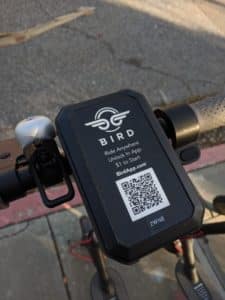Posted in Personal Injury, Personal Injury Lawyer
Arlington VA fails to protect pedestrians, riders in new scooter program
Dockless standing scooters and electric-assist bicycles have become a staple in the Washington, DC metro area seemingly overnight. A decision by the Arlington County Board to open an Arlington VA pilot program will likely prompt even more expansion in this area. However, the board’s decision to ban scooters from sidewalks could leave injured riders unprotected due to Virginia’s restrictive tort laws.
The District’s decision to allow a new pilot program last year has led to thousands of scooters propped on sidewalks, leaning against trees, or spinning merrily down streets. Unfortunately, the new mobility option has resulted in a flood of new car accidents, bicycle accidents, and pedestrian accidents. After a collision involving an electric bicycle or personal mobility device, who is to blame? Since the majority of personal injury cases settle out of court, the determination of liability often hinges on negotiations between plaintiff attorneys and auto insurance companies, and insurance companies use any excuse they can to avoid taking responsibility.

(Creative Commons, wikimedia user grendelkhan)
Allowing dockless scooters in Arlington County
With the Arlington County Board voting unanimously last Tuesday to start its own dockless standing scooter trial on October 1, Arlington VA can expect the number of injuries in northern Virginia to rise as well. Already, a Washington, DC scooter accident claimed the life of one 20-year-old rider, and authorities say the trend of injuries is on the rise.
Although accidents involving standing scooters typically involve lower speeds than typical car accidents — the Arlington County Board has limited the speed of these electric scooters to 10 miles per hour — the unprotected nature of riding a scooter means that injuries from a scooter accident can be severe. Hospitals and bicycle accident attorneys in Arlington VA often see fractured wrists, sprained ankles, and dislocated shoulders in addition to serious back injuries and strain. Even worse, a scooter accident can result in concussion, traumatic brain injury, and lifelong neurological damage if a rider strikes her head during the accident.
Moreover, the Board’s decision to restrict dockless scooters from sidewalks will place riders at additional risk. Formerly, there was no regulation prohibiting the use of electric scooters on sidewalks, as seen here on in an archived snapshot of the county’s website:
Can the scooters and bikes be ridden on sidewalks and trails?
Arlington County has no regulation that prohibits riding bikes or scooters on sidewalks.
The Board’s reversal of this policy will force scooter operators onto Arlington VA roadways, where they will have to compete for space with motorcycles, passenger vehicles, and trucks.
Who is to blame when a vehicle collides with a dockless scooter?
Even more troubling, the decision could block many injured riders from recovery after an accident, due to Virginia’s onerous tort regulations. In most states, courts assign blame in an automobile accident based on who did more to contribute to the accident. Even if both of the parties share blame, an injured plaintiff can still recover for the portion of their injuries they were not responsible for. This “comparative negligence” standard controls tort claims in almost every jurisdiction.
However, Washington DC and Virginia, along with neighboring Maryland, are among a handful of jurisdictions which apply the less-common “contributory negligence” rule. Under this standard, an injured driver, rider, or pedestrian is completely barred from recovery if the other side can show that they were even 1% responsible for the accident. Because pedestrian, bicycle, and scooter accidents often involve uncertainty but still result in disproportionately serious injuries, this leaves riders highly vulnerable. When riders have no health insurance or auto insurance of their own, they cannot recover tens of thousands of dollars in medical bills and lost wages.
Fortunately, Washington DC passed the Motor Vehicle Collision Recovery Amendment Act in late 2016, which provides an exception to the contributory negligence rule for pedestrians and bicyclists. Under this statute, riders can still recover damages for their injuries even if they were held partly responsible, as long as they were not the primary culprit.
However, the DC exception only protects a “non-motorized user” and thus would exclude scooter and electric bicycle riders. Even worse, Virginia has no such protections at all.
How insurance companies avoid responsibility for accidents
Because Virginia bars plaintiffs from recovery in an auto accident if they contribute even 1%, scooter operators who use a crosswalk or who move briefly onto a sidewalk to avoid a vehicle could have no recourse if struck by a vehicle. Insurance companies can claim that since electric scooters in Arlington VA are now barred from sidewalks, including crosswalk areas, a rider injured by a vehicle “contributed” to the accident. This will allow the at-fault party to escape responsibility.
Even for riders who attempt to follow the new regulations, the uncertainty often present in pedestrian or bicycle collisions will give insurance companies additional leverage to ignore claims. The Arlington County Board’s decision to bar riders from sidewalks will force thousands of riders into harm’s way and leave them without protection when scooter accidents inevitably happen.































